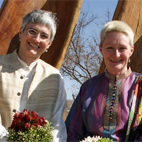Advancements & Achievements« Back to Advancements & Achievements Listings

The Most Remarkable South African Hero You've Never Heard Of
By Rowan Philp
A human rights lawyer trained at Rhodes University, Patricia Lambert was South Africa’s lead negotiator on a global treaty that, according to a new WHO report, will save 7.4 million lives by 2050.
The initiative was the Framework Convention on Tobacco Control, which binds 168 countries to strict limits on smoking and its diseases, and it has been implemented in 41 countries to date. Smoking kills 5 million people around the world annually, dwarfing death tolls even from AIDS and war.
Now, Lambert, 59, is Director of the International Legal Consortium for the giant anti-smoking agency set up by New York Mayor Michael Bloomberg, the Campaign for Tobacco-Free Kids. Her team assists lawyers and lawmakers in almost 50 low- and middle-income countries to enact legislation to limit the ravages of smoking and to mount a fight against the massive resources of big tobacco.
And Lambert celebrated a different but equally historic legal victory on the steps of the U.S. Supreme Court on June 26. Her South African marriage to a US woman, Kathy Mulvey, was finally recognized by the US government after the Defense of Marriage Act was struck down.
“It was such a joyous moment!” she told SABLE. “I remember being struck wondering how—until that moment—this huge, mature democracy had done the wrong thing for so long while my medium-sized country had done the right thing for our freedom.”
Lambert fell in love with Mulvey while negotiating the tobacco treaty in Geneva, where she co-led a key legal effort to have tobacco-related illness recognized as an “epidemic.”
By virtue of being a resident, at the time, of the first US state to recognize same-sex marriage—Massachusetts—Mulvey could have married there. Ironically, this was thanks to a South African judge, Margaret Marshall, who—as Massachusetts Chief Justice—pioneered gay marriage in the U.S. with her landmark “Goodridge” ruling in 2003, allowing same-sex marriage in the state. However, she would receive none of the federal benefits enjoyed by heterosexual marriages everywhere, while Lambert would have no path to residency or a green card as her wife.
Instead, they chose to marry in South Africa on Women’s Day 2007 at the Cradle of Humankind and were forced to conceal the fact of their marriage to both the US government and even on ordinary contracts, thanks to the anti-gay marriage DOMA legislation.
Despite an intention to live with Lambert in the U.S., Mulvey—an American civil society professional—agreed to marry in South Africa because its constitution was far more advanced than America’s on non-discrimination.
Lambert said the wedding was “a celebration of our wonderful Constitution and the inspirational efforts of those who fought for our freedom.”
“Here was Kathy, legally married and a US citizen, and she’s filing her tax returns singly,” Lambert said. “Kathy became a second-class citizen instantly (under DOMA). We were advised by lawyers in Boston that if we were married by South African law and were a heterosexual couple, the U.S. would recognize our marriage, but because we were a same sex couple—because of DOMA—our marriage could never be recognized at the federal level in the United States.”
Now, Lambert is focused on helping countries around the world prevent the world’s leading cause of preventable deaths. She worked as advisor to both Justice Minister Dullah Omar and Health Minister Manto Tshabalala-Msimang.
Recalling her time with her highly controversial second boss in government, Lambert said Tshabalala-Msimang had been both a “true feminist” and a positive force for various human rights initiatives, including key protections for victims of sexual violence. However, she said was perplexed and upset by the minister’s later embrace of AIDS denialism and her resistance to the roll-out of anti-retroviral drugs, which have since been credited for saving millions of lives.
She lives were now being saved on a similar scale by new anti-smoking laws, adding that “world history was made when the FCTC was ratified in 2005…but the treaty only exists on paper; it has to be implemented. Lawyers have a huge role to play in this. There are some very unsubtle and also subtle conflicts of interest between corporations and the government’s role to create regulation around those products, how they are sold, how they are labeled, etc. My concern is that voluntary agreements only take us so far. Being alive to those conflicts of interest is very important.”

